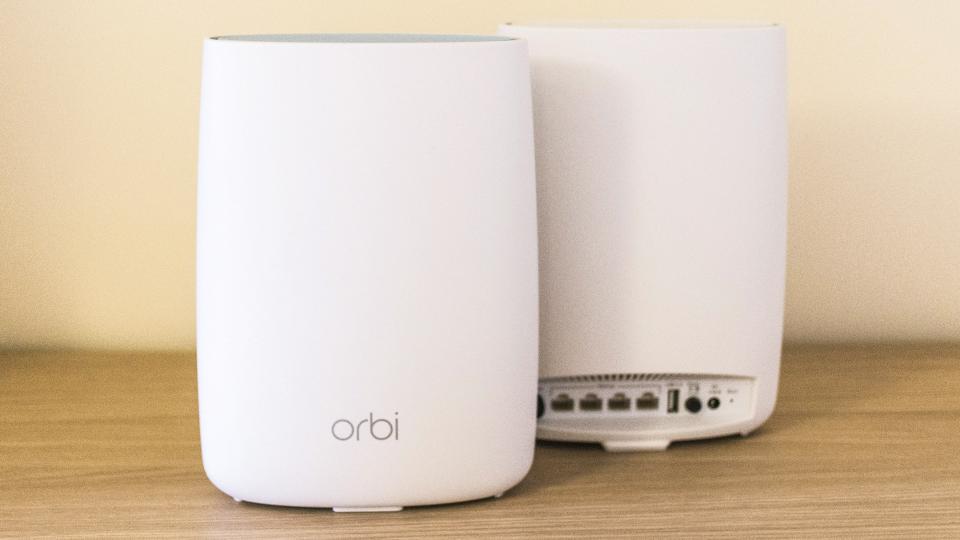Summary
Eero Pro (2 nodes) is more flexible and has a far superior phone app with more features. Orbi RBK50 (2 nodes) is a better bet for those who only care about pure performance and specs, with less concern for user-friendliness.
Setup
Both Eero and Orbi are easy to install, but Eero takes the win in this category. It’s a battle between good and great. Orbi isn’t difficult, but there are some hiccups and occasional problems. Alternatively, Eero is so easy that your tech-challenged parents could install it in less than 30 minutes (it only takes me 10 minutes to install).
The Eero instructions are clear and straightforward. Whether this is your first mesh router system or you have no idea what a router is, the instructions make it very easy. Not only that, but you’re told where to put the routers, and there are troubleshooting tips for improving the signal.
Eero rarely gives any errors (and I’ve installed this system four times) and the three pieces are interchangeable. Plus, Eero makes each new version easier to install because they pay attention to their users.
Orbi’s installation is also good, but not as easy as Eero. The app gives clear and straightforward instructions. While there are only two nodes to install instead of three, they are not interchangeable. I’ve also encountered one consistent problem with the instructions.
The instructions tell you to power the satellite routers and then the network, but this gives me errors. However, it seems to resolve if I set up the network and then power on the satellite nodes. Nothing huge, but it’s a small issue you won’t see with Eero.
Setup winner: Eero Pro
Software
Eero has brilliantly designed software and features while Orbi has a subpar designed Web-based portal that is good for techies, but not ideal for the common user. I’m gearing this a little more towards conventional users, so power users may prefer Orbi, but I’m giving Eero the win here.
If there are any issues, then Eero resets itself in the background or you can reset the router from the app. The Family Profiles setting lets you make a profile for everyone in the house. You can then pause specific devices or give each profile scheduled access, which is perfect for parents who want to limit internet time and access.
Bandwidth is a limited resource and you’ll notice this when everyone is home and you’re trying to download or upload a big file. Eero lets you prioritize a device so it’s the most power for as long as you need, which is ideal for time-sensitive work. It’s also easy for friends to login because you can send them a token or they can scan a QR code (no more WPA2 passwords).
Eero has two options subscriptions. Eero Secure ($3/month) provides enhanced security and advanced parental controls. Eero Secure+ ($10/month) has all the same features along with a VPN, password manager, and antivirus protection. You also get Thread support and you can use the node as your smart hub, plus there are some interesting Alexa controls for finding your phone, pausing the internet for meals, or pausing certain profiles.
There are three small issues with Eero. There’s no web-based interface, but the app is great. You can see real-time bandwidth usage, but you can’t monitor daily, weekly, etc. You only get one admin profile, so parents may want to share that same profile.
Orbi isn’t quite as versatile or easy. They do have a web-based interface with lots of tools for power users. If you’ve used Netgear routers before, then you know what this looks like. One good thing is that the router can be installed without a smartphone. However, I prefer routers with smart features and a great app, and that’s not what you get with Orbi.
The app frequently gives me a “Router Not Set Up” warning, but then runs fine when I tap “Dismiss.” There’s no auto-reset, device prioritization, parental controls (more on this), or smart features. Also, the app can take minutes to connect to the routers for resetting or anything else. Parental controls are available through “Circle with Disney” for $5/month.
The Traffic Meter feature lets you see bandwidth for the last week or month, but the design could be better. You can also name, pause, and reboot devices. Netgear Armor is available for $70/year, but the protection seems wonky. Firmware updates are uncommon and usually cause user issues. One bonus though is you don’t need the cloud, whereas Eero requires it. There is Alexa access to reboot the router and other commands.
Overall, Eero is much smarter, more intuitive, and easier to use. Orbi isn’t bad and is better for power users, but even many of them will find Eero is the better option.
Software winner: Eero Pro
Performance
Orbi wins on raw power and provides slightly faster speeds, but Eero Pro is nearly the same. Keep in mind that my internet speed at my house tops out at 117/mbps, so the difference between Orbi and Eero would be larger with higher internet capabilities. Eero Pro has a theoretical limit of 600/mbps, while Orbi RBK50 has a theoretical limit of 2,200/mbps.
As our baseline, one Eero Pro (2nd Gen) averaged 108/mbps and is a tri-band router. (These tests were done at my house in ten designated testing locations.)
Using two Eero Pro nodes gave me an average speed of 112/mbps and covered about 4,000 square feet.
Alternatively, one Eero Pro with two Eero Beacons gave me an average speed of 111/mbps and covered about 4,500 square feet. In this configuration, there are three nodes and my devices didn’t always connect to the closest node (resulting in slower speeds).
I recommend one Eero Pro with two Beacons three-piece for tall and narrow homes, long and narrow homes, or any strange configurations. While more cookie-cutter houses would be better off with two Eero Pro routers.
Now, let’s compare this to Orbi. The solo routers I used were Orbi RBK50 and RBK40. They both gave an average of 100/mbps, but the RBK50 would have given higher speeds with better WiFi.
Using two Orbi RBK50 nodes gave me an average of 115/mbps. This should cover 5,000 square feet, but it seemed closer to 4,000. It doesn’t look like a big speed upgrade on paper, but this is due more to my internet limitations of 117/mbps. Orbi will perform better than Eero if you have higher internet capabilities because it has a higher theoretical limit than Eero. Orbi only has two nodes, which improves the rate of connecting to the closest one.
However, I do have reservations about calling Orbi the clear winner. They have lower user satisfaction, mainly because signals occasionally cut out. I didn’t see this in my testing, but it’s a consistent complaint. Also, since I couldn’t test with gigabit internet, my tests only yielded similar results for the two. So I can only guess that Orbi is significantly stronger, since I didn’t see this for myself (as the numbers above show).
Setup winner: Orbi
Design
Eero looks much better than Orbi. It’s not close. The Eero Pro base is small and beautiful, like a tiny piece of art. The Beacons are even smaller and plug directly into an outlet, so you don’t need an open shelf or countertop.
As an added bonus, you can turn the Beacon into a nightlight. However, there are some small downsides. The Pro only has two Ethernet ports, and one must be used for your modem. The other issue is that the Beacon has no ports.
Proving true to be the mesh router of power users, the Orbi has many ports. There’s an Ethernet for the modem, three other Ethernet ports, and a USB port. However, that’s the only benefit to these routers.
The RBK50 base is a monster and needs a shelf to itself. Thankfully there are only two nodes, but it’s just not attractive. There are outlet routers similar to the Beacon, but they’re also relatively bulky. You can also get an outdoor satellite router that’s weather resistant.
Design winner: Eero Pro
Final Thoughts
Mesh routers are great for extending your range and ensuring that everyone in your house has a strong internet connection. While Orbi is good for power users and anyone interested only in maximizing their internet specs. Eero is the real winner here. The features are amazing, the performance is very good, and it wins in every other category. Plus, it’s so easy that even the severely tech challenged can install it.

